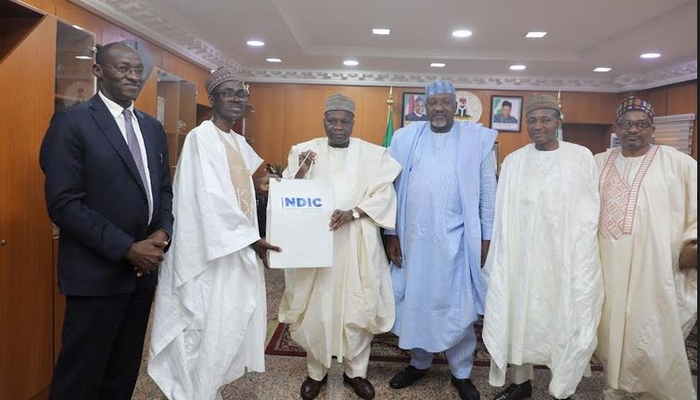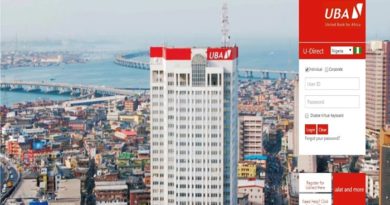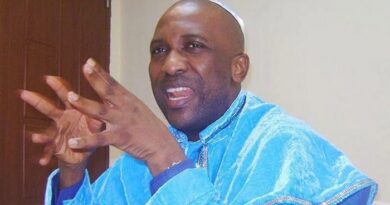NDIC’s coverage limits best in the world- MD
The Managing Director/Chief Executive of the Nigeria Deposit Insurance Corporation (NDIC), Bello Hassan (FCA) has pointed out that the Corporation’s coverage limits of N500,000.00 per depositor per commercial, merchant and, non-interest bank, primary mortgage bank and mobile money operator, as well as N200,000.00 per depositor per microfinance bank, remain the most adequate and robust in the world.
He made this clarification at the opening ceremony of the 18th edition of the workshop for business editors and Finance Correspondents Association of Nigeria (FICAN) on Tuesday 26th October, 2021 at Gombe.
According to him: “I will like to seize this opportunity to address the seemingly simple but knotty issue of the NDIC’s deposit insurance coverage limits that has always been misunderstood by stakeholders. The issue is so fundamental and needs to be thoroughly interrogated in the interest of all depositors to in order to sustain the Corporation’s rich legacies and the multiple ingenuous operational landmarks it was able to achieve in its over three decades of existence despite daunting challenges. I was made to understand that the issue also provoked strong reactions during some of the presentations at the workshop held in Ibadan.
“Much of the concerns are predicated on the lack of adequate understanding of the principles, rationale and realities that informed the determination of our coverage limits. It is in that respect that we urge the media through this forum to make Nigerian depositors aware that the NDIC’s maximum coverage limits of N500,000.00 per depositor per commercial, merchant and, non-interest bank, primary mortgage bank and mobile money operator, as well as N200,000.00 per depositor per microfinance bank remain the most adequate and robust in the world.
“Participants at the Ibadan workshop had been very critical that the coverage limits are not only small but required an urgent upward review in order to engender stronger public confidence in the banking system.
“Nonetheless, I need to reiterate that, as it is today, these limits are not only adequate, they are also consistent with the extant provisions and recommendations of the International Association of Deposit Insurers (IADI) in its Core Principle for Effective Deposit Insurance System on the determination of coverage limits.
“The IADI Core Principle No. 8 on coverage limits specifically requires that the thresholds should be limited, credible with the capacity to fully cover substantial majority of bank depositors while the rest remain exposed to ensure market discipline. Deposit insurance coverage should also be consistent with the deposit insurance system’s public policy objective.
“In addition, the coverage limits are not designed to be static but subject periodic reviews to ensure that they are consistent with the public policy objectives of the Deposit Insurance System. The Corporation successfully reviewed upward the coverage limits from N50,000 at inception in 1989 to N200,000 in 2006 and N500,000 in 2010.
“In the same vein, the Corporation invites you to note that in 2016, 2017, 2018 and 2019, the total number of accounts in the deposit money banks stood at 83.0 million; 99.1million; 112.0 million and 128.4 million respectively. Out of these numbers, the N500,000 coverage limit fully covered 99.4%; 97.6%; 97.5% and 97.6% of accounts, respectively. What these figures entail is that only less than 3% of accounts/depositors are not fully covered by the prevailing coverage limits. The implication of this is that in the event of failure of a bank, above 97% of depositors would be fully covered by the Corporation.
“From the foregoing statistics, it could be observed that the Corporation’s deposit insurance coverage limits are not only adequate but robust enough to engender confidence in our banking system.
“Distinguished participants, it has become imperative to take you through this historical and operational perspective to enable you assist the Corporation in sensitizing all our stakeholders with a view to correcting the misconception around the NDIC coverage limits.
“In all of this, the media, the civil society groups, along with the insured financial institutions that are represented at this workshop will remain the most strategic and critical stakeholders that we cherish the most. Through the better understanding of our programmes and policies, it is hoped that you will not only be better informed in the coverage of our activities, but also be well-equipped to contribute to our advocacy and mobilization for a better financial system.
“I therefore call on you to continue to support the Corporation in its resolve to fully deliver on its core mandates. On our part, we promise to keep our doors open to your suggestions and observations, while partnering with you on capacity building and other areas of mutual benefit”.
Speaking on the workshop itself, he said it has always been a very important part of our capacity building initiative for the media, towards a well-informed reportage and sensitization of stakeholders on the mandate of the Corporation and the developments within the financial services industry.
“It is to this end that the Corporation expanded the scope of the workshop, to include representatives of the civil society organizations and Corporate Affairs Managers of Banks in 2014 and 2020, respectively to broaden the scope of engagements with our strategic stakeholders.
“Against this backdrop, I will like to assure you that the Corporation, under the current leadership, will not only sustain the legacy of this workshop but also seek ways to strengthen it, in the overall interest of financial journalism and the stability of banking system in general”, he assured.
On the choice of the theme of the workshop: “Enduring Extreme Disruptions: Resilience & Reinvention for Banking System Stability & Deposit Insurance” which he said was apt, he added: “As economies across the globe continue to grapple with the devastating impact of the COVID-19 Pandemic, it has become expedient and highly desirable, for supervisors to come up with appropriate strategies that are required to build resilience into our financial system as we seek to provide the much-needed support to the Federal Government’s economic recovery agenda. The workshop theme, as well as the papers to be deliberated upon along with the quality of the resource persons, were carefully selected to achieve the same objective”.
Picture caption:
MD/CE NDIC, Bello Hassan (2nd left) presenting NDIC research publications to the Executive Governor of Gombe State, HE, Alh. Muhammad Inuwa Yahaya (3rd left) while Director, Communication & Public Affairs NDIC, Bashir A. Nuhu (1st left); Chief of Staff to Gombe State Governor, Alh. Abubakar Inuwa Kari (4th left); Executive Director, Operations, NDIC, Mustapha Mohammed Ibrahim (2nd right) and Deputy Director, MD/CE’s Office NDIC, Iliyasu Sani watch during courtesy call to the Governor before the opening ceremony of the ongoing 2021 NDIC FICAN Workshop in Gombe.




